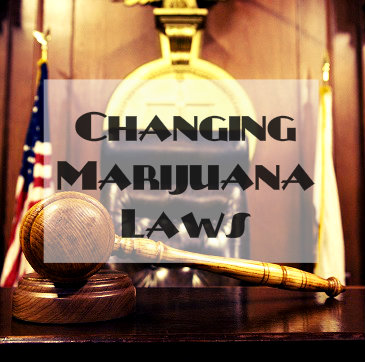How Have Marijuana Laws Changed?
Attitudes toward cannabis, also known as marijuana, have been undergoing a major shift in recent years. Long known to be one of the less hazardous of illicit drugs, smoking pot still carries risks. There are health problems, the possibility of harming children and teens, not to mention the dangers of driving while high. In spite of the negative aspects, some believe in the pros of legalizing marijuana for recreational use, including voters in Colorado and Washington state.
Which Marijuana Policies Have Changed?
 Society’s attitudes toward marijuana have been changing for decades. Some municipalities decriminalized the possession of small amounts of marijuana long ago. In these cities, users may get ticketed, but fines and other repercussions are minimal. In 1996, California became the first state to pass and enact legislation for the legalization of medical cannabis. This allowed doctors to prescribe marijuana to patients who might see benefits from using it.
Society’s attitudes toward marijuana have been changing for decades. Some municipalities decriminalized the possession of small amounts of marijuana long ago. In these cities, users may get ticketed, but fines and other repercussions are minimal. In 1996, California became the first state to pass and enact legislation for the legalization of medical cannabis. This allowed doctors to prescribe marijuana to patients who might see benefits from using it.
After debating the pros and cons of legalizing cannabis, 20 states, as well as the District of Columbia, now allow the legal use of medical marijuana. More recently, residents in the states of Washington and Colorado voted to expand the legality of cannabis and recreational use is now allowed. Alaska may be the next state to pass such legislation. Enough signatures have been collected there to get the issue on the ballot this summer. While states continue to make policy changes regarding marijuana, it is important to remember that this is still an illegal drug, for any type of use, according to the federal government.
What Are The Cons Of Legalizing Marijuana?
Perhaps the biggest reason that states have agreed with their voters and have decided to start legalizing marijuana is for the revenue. As state and local budgets suffer, taxes collected from selling marijuana could make a big difference. There are downsides too, which states and local governments need to consider. The most obvious negative impact could be public health. Marijuana is a mind-altering substance that is most often smoked and could contribute to cancer and lung disorders.
Cannabis is a drug with psychoactive properties. It renders users relaxed and happy, but can also cause paranoia, delusions, and, as a result, some risky behaviors. It impairs judgment and can cause the user to make bad choices and can lead to self-harm and accidents. Just how damaging users under the influence may be remains to be seen. Driving while high on legal marijuana could be a huge issue for public safety.
Among all the negatives of legalizing marijuana, some critics are most concerned about how the policy changes could affect young people. Alcohol has long been legal, but controlled and age-restricted, and yet the harm that it has caused to teens has been dramatic. Underage drinking kills many people every year. Critics of legalized cannabis worry that marijuana will get into the hands of kids and teens more often now and that the impact could be severe. As policies and attitudes regarding this drug shift across the country, it is our responsibility as citizens to be informed.



